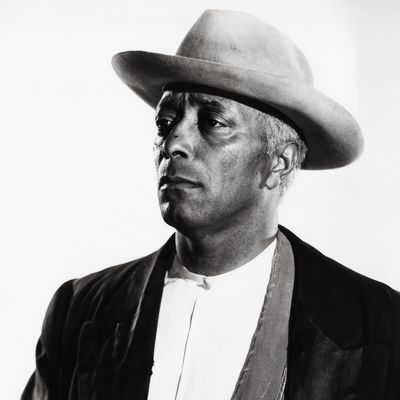
Fame, at least lasting fame — the your-work-goes-down-in-history kind, often accompanied by fat royalty payments — is a club that thinks of itself as an unbiased meritocracy, blind to everything but aesthetic innovation and popular success. It’s never quite worked out that way. When we look at the past, we still see generations of great talents who never quite got their due critically or commercially, many of them left relatively unsung. In this ongoing series, our critics pick artists they feel remain underappreciated and tell their stories and sing their praises.
I was first introduced to Afro–Puerto Rican actor Juano Hernández in the uneven, treacly 1950 drama Young Man With a Horn. It may have been top-lined by icons like Kirk Douglas, Lauren Bacall, and Doris Day, but it is Hernández’s eyes — luminous, soulful, warm — that have singed themselves into my memory. He has a somewhat thankless role as the mentor and father figure who nurtures Douglas’s character’s musical gifts, but his greatest strengths as an actor can be found within the folds of this role: the ability to reveal untold depths in characters positioned more as narrative devices than as full-fledged human beings, a palpable sense of warmth, and the determination to take up space even when he isn’t afforded any.
Hernández was born in San Juan, Puerto Rico, and had no formal education; the particulars of his biography are hard to glean. After coming to the United States, he reportedly moved through various careers as a carnival performer, boxer, vaudeville entertainer, and a voice actor for radio, which put his rich baritone to marvelous use. He performed in a variety of mediums — from all-black revues on Broadway to blunt noirs to sleek Hollywood productions — but remains curiously absent in larger conversations about the art of acting and reexaminations of black identity throughout film history. He died in his hometown in 1970, at the age of 74, after suffering a cerebral hemorrhage. It’s hard to sketch Hernández’s place in Hollywood. He was a recognizable character actor who earned a Golden Globe nomination for New Star of the Year for the 1949 crime drama Intruder in the Dust, but he wasn’t spoken about fervently or exalted like Dorothy Dandridge, the marquee black star who cemented a place in Hollywood history.
Black artistry within film history is most often defined in terms of loss — we talk about what was withheld because of racist strictures more than the work that glimmers onscreen. As an Afro-Latino, Hernández occupied an even more confined place in film, with an inability to find stature in Latin American cinema and a lack of opportunities to play Latino roles in Hollywood due to the industry’s myopic understanding of that identity.
(Hernández played a Latino character in film just twice: in the 1932 Oscar Micheaux–helmed The Girl From Chicago, as the Cuban racketeer Gomez, and in 1958’s Machete, as a majordomo on a Puerto Rican plantation.)
Like many actors of color, Hernández presents an intriguing what-if. What if he had been given lead roles that matched his talents? What if he were truly given the star treatment that his brushes with fame, including that Golden Globe nomination, would have you expect? What if Hollywood ever knew what to do with an Afro–Puerto Rican like him? But Hernández is more than an emblem of the painful limitations that have prevented black actors across the diaspora from realizing the full breadth of their gifts in film.
Whether playing the doomed partner to John Garfield’s captain in 1950’s The Breaking Point, a yearning loner in 1964’s The Pawnbroker, or Mealie Williamson, his final role in 1970’s They Call Me Mister Tibbs!, Hernández embodied an eloquence that made it hard to take your eyes off him, from the crinkle of his brow to how he moved with rough-hewn grace. But what remains most memorable to me about Hernández’s work during Hollywood’s mythologized golden age is his pride. I have never seen a black actor during that swath of film history in America more unapologetically proud and self-possessed. His performance in Intruder in the Dust, in which he plays Lucas Beauchamp, a black farmer accused of murdering a white man, is his best work because of this quality.
Hernández inhabits Lucas as the kind of proud black man who refuses to bend to the racist world around him. The white southern townsfolk clamoring for his blood grow incensed at his refusal to play the role expected of black men—to cower, to plead, to shrink. Hernández’s walk is wide yet measured as he makes his way in handcuffs through a throng to the police station. In doing so, he becomes a Hollywood rarity: an Afro–Puerto Rican man purposely taking up space in the world.
*This article appears in the January 6, 2020, issue of New York Magazine. Subscribe Now!
More From 'The Undersung'
- Anne Beatts Was Always More Interesting Than John Hughes
- Alice Childress Didn’t Defang Her Plays, and Producers Said No
- It’s Time We All Heard the Music of Lili Boulanger


